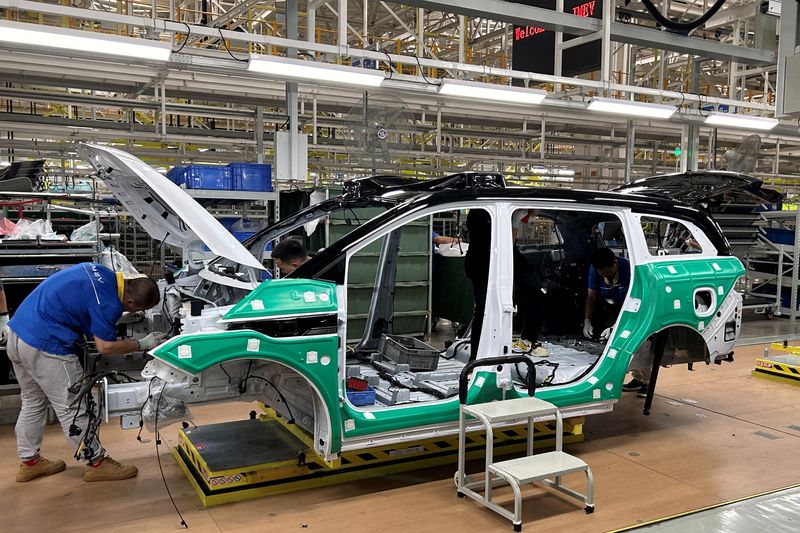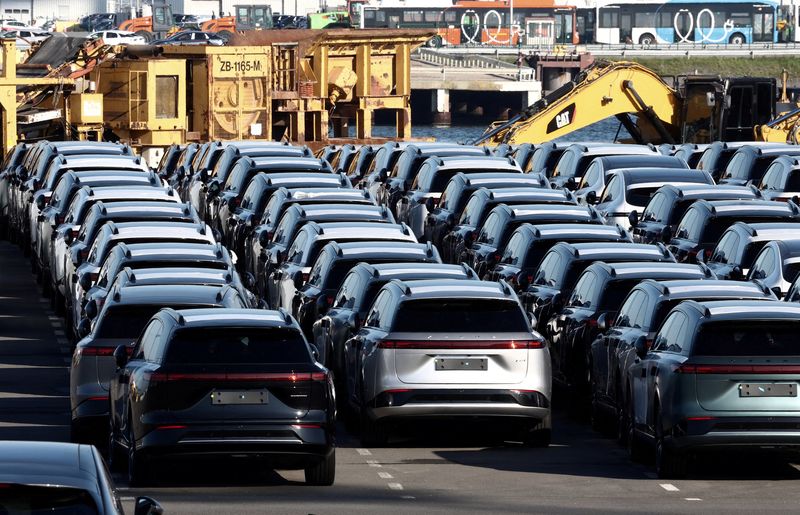By Philip Blenkinsop
BRUSSELS (Reuters) - The European Union formally approved imposing tariffs on Chinese-made electric vehicles (EVs) on Tuesday after an investigation that has divided the bloc and prompted retaliation from Beijing.
The European Commission has set rates ranging from 7.8% for Tesla (NASDAQ:TSLA) to 35.3% for China's SAIC and other producers deemed not to have cooperated with the EU's anti-subsidy probe. These will be on top of the EU's standard 10% car import duty.
WHEN AND FOR HOW LONG?
The EU also published its regulation imposing final or "definitive" tariffs in the EU's Official Journal on Tuesday.
They will apply from Wednesday for five years.
The Commission has decided that provisional duties dating back to July will not be collected. Companies had been able to cover these with a bank guarantee.
The tariff imposition follows a vote on the Commission's proposal for definitive tariffs by the EU's 27 members on Oct. 4 - with 10 in favour, five against and 12 abstentions.
CONTINUED TALKS WITH BEIJING
The Commission has said it is willing to continue negotiating an alternative to tariffs with China even after tariffs are imposed. Both sides have agreed to a ninth round of technical negotiations, although the EU said there were "large remaining gaps".
The EU executive said last month it could re-examine price undertakings - involving minimum import prices and typically volume caps - having previously rejected those Chinese companies have offered.
Previous minimum price deals agreed by the EU have been for homogenous commodities, rather than complex products such as cars. The Commission believes a single minimum price would not be adequate to counter injury caused by subsidies.
It might also have to be different for separate producers, depending on the value of sales and receipt of subsidies.
Beijing has repeatedly warned the Commission against separate negotiations with EV companies. Various manufacturers have authorised the China Chamber of Commerce for Machinery and Electronics to negotiate on their behalf.
The Commission has said any alternative must be in line with World Trade Organization (WTO) rules, adequate to remove the injury due to subsidies, and enforceable.
CHINESE RETALIATION
In moves seen as retaliation, China has launched anti-dumping investigations into EU exports of pork and brandy, and an anti-subsidy probe into EU dairy products, but it has yet to impose any measures.
The EU launched a challenge at the WTO in September against the dairy probe.
China's Commerce Ministry has also met with automakers and industry associations to discuss raising import duties on large-engined gasoline vehicles, which would hit German producers hardest.
Germany's exports of vehicles with engines of 2.5 litres or larger to China were worth $1.2 billion last year, Chinese customs data shows.
WHAT HAPPENS AFTER THE INVESTIGATION?
Any company not in the sample group of BYD, Geely and SAIC that wishes to have its own individual duty can ask for an "accelerated review" just after the imposition of definitive measures. Such a review should last a maximum of nine months.
The Commission can also carry out an "interim review" after a year has elapsed if the measures are no longer necessary or if they are not sufficient to counteract subsidies.
The Commission often looks into whether producers are evading duties via exports of parts for assembly elsewhere. For the EU, such circumvention exists if 60% or more of the value of parts are imported from the country subject to duties and if the value added in the assembly is no more than 25%.

Companies can dispute the measures at the European Court of Justice. China has already launched a challenge at the WTO. Both legal paths can take well over a year.
The Commission has said it is confident its investigation and measures are compatible with WTO rules.
